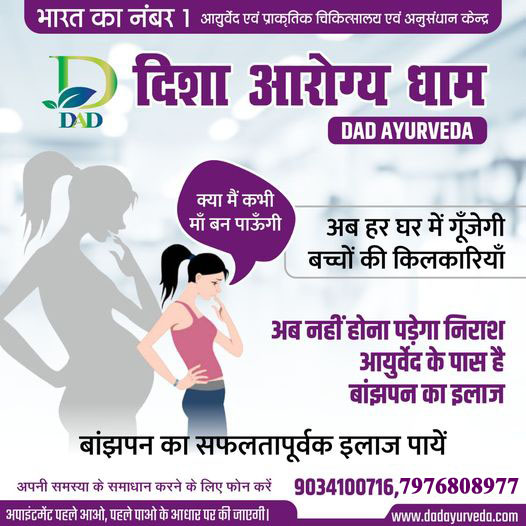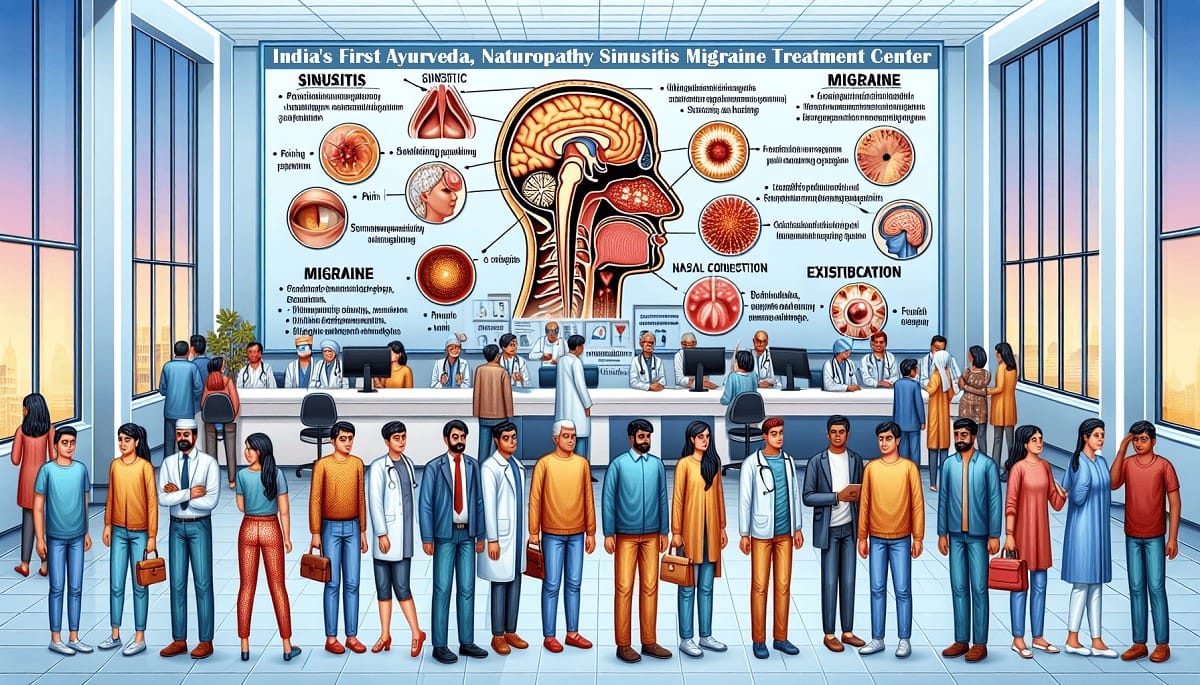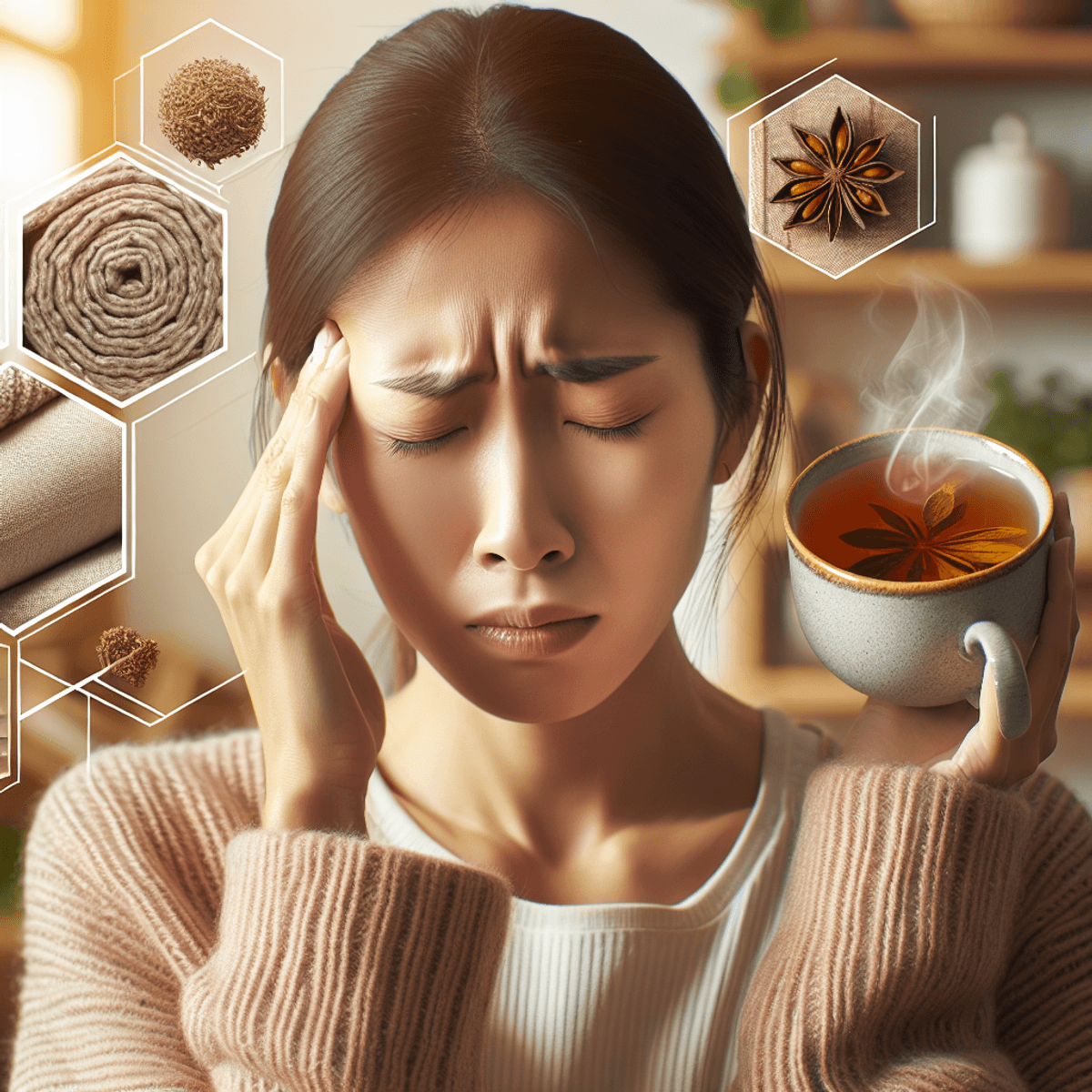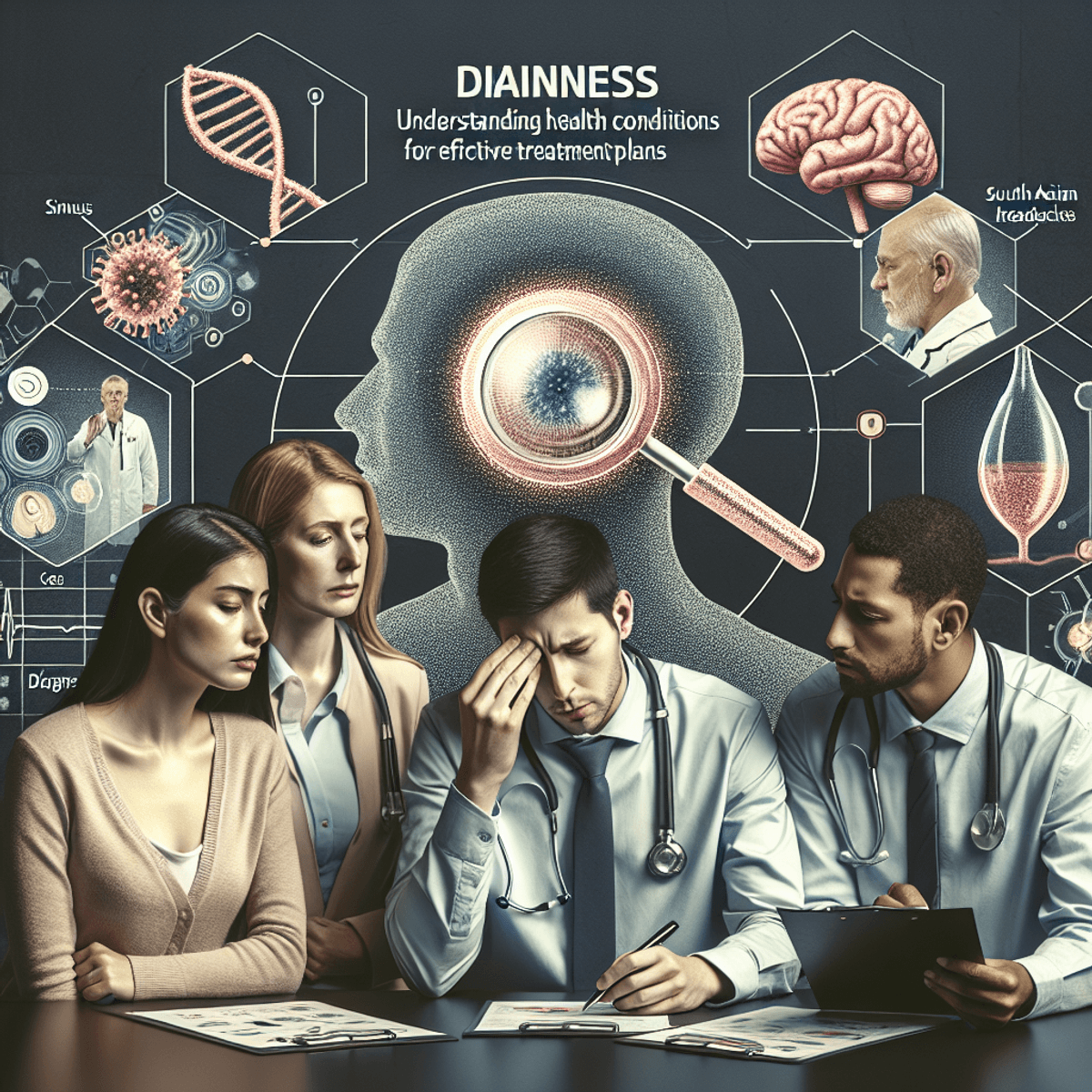Services
Sinusitis Migraine Treatment Center
Sinusitis Migraine Treatment Center
Introduction
Sinusitis migraines are common yet often misunderstood conditions that can cause significant discomfort. Sinusitis, an inflammation of the sinus cavities, typically results from infections, allergies, or structural nasal issues. Symptoms include pain or pressure around the eyes, cheeks, and forehead; nasal congestion; and fatigue. Migraines, characterized by throbbing headaches, nausea, and sensitivity to light and sound, can sometimes mimic sinusitis symptoms.
While sinusitis and migraines share similar symptoms, it is crucial to differentiate between the two conditions for proper treatment. Misdiagnosis can lead to ineffective management and prolonged suffering. At our specialized Treatment Center, we offer comprehensive evaluations to accurately diagnose and address sinusitis or migraines. Our team of experts utilizes advanced diagnostic tools and personalized treatment plans to target the underlying causes, providing relief and improving quality of life.
Specialized treatment centers like Disha Arogya Dham play a crucial role in providing effective care for these conditions. By focusing on accurate diagnosis and personalized treatment plans, these centers help you manage both sinusitis and migraines more effectively. With the right approach, you can find relief and regain control over your health. Don’t let the symptoms of sinusitis or migraines hold you back any longer.
Schedule a consultation at Disha Arogya Dham today and take the first step towards a healthier, happier life. specialized treatment centers like Disha Arogya Dham play a crucial role in providing effective care for these conditions. By focusing on accurate diagnosis and personalized treatment plans, these centers help you manage both sinusitis and migraines more effectively. With the right approach, you can find relief and regain control over your health. Don’t let the symptoms of sinusitis or migraines hold you back any longer. Schedule a consultation at Disha Arogya Dham today and take the first step towards a healthier, happier life.
Understanding Sinusitis and Migraines
Sinusitis is an inflammation of the sinus cavities caused by viral infections, bacterial or fungal infections, allergies, or structural issues within the nasal passages. The primary symptoms include:
- Pain or pressure around the eyes, cheeks, and forehead
- Nasal congestion
- Thick discolored nasal discharge
- Reduced sense of smell
- FatigueDifficulty breathing through the nose
- Headaches, particularly in the forehead or around the eyes
- Migraines, on the other hand, are severe headaches that can be accompanied by a range of symptoms such as:
- Throbbing pain on one side of the head
- Nausea and vomiting
- Sensitivity to light and sound
- Visual disturbances
- Both sinusitis and migraines can significantly impact your quality of life. At Disha Arogya Dham, our team of specialists will work closely with you to determine the underlying causes of your symptoms and develop a personalized treatment plan. Our comprehensive approach may include medications, lifestyle modifications, sinus rinses, and in some cases, minimally invasive procedures.
- By addressing both sinusitis and migraines together, we aim to provide long-term relief and improve your overall well-being. Don’t let these conditions hold you back any longer. Take the first step towards relief by scheduling a consultation at Disha Arogya Dham today.

These symptoms often lead to sinus headaches, which are characterized by dull, persistent pain that can worsen with sudden movements or bending over. Sinus headaches typically resolve once the underlying infection clears up.At Disha Arogya Dham, we understand the impact that sinusitis and migraines can have on your daily life. That’s why we take a comprehensive approach to treatment, addressing the underlying causes of your symptoms and tailoring a plan that is specific to your needs. With our team of specialists, you can trust that you are in capable hands. Don’t let these conditions continue to hold you back. Schedule a consultation with us today and take the first step towards long-term relief.
Migraines, on the other hand, present a different set of characteristics. They are a type of headache known for their intense throbbing pain usually localized to one side of the head. Other common migraine symptoms include: nausea, vomiting, and sensitivity to light and sound. These symptoms can be debilitating and significantly impact your quality of life. At Disha Arogya Dham, we understand the complexity of migraines and the need for a personalized approach to treatment.
Our team will work closely with you to identify triggers, develop a management plan, and explore various treatment options such as medications, lifestyle modifications, and alternative therapies. We are committed to providing you with comprehensive care that addresses both sinusitis and migraines, giving you the best chance at long-term relief. Don’t let these conditions control your life any longer. Take the first step towards a brighter, pain-free future by scheduling a consultation with us today.
- Nausea and vomiting
- Sensitivity to light and sound
- Aura (visual disturbances such as seeing flashing lights), and fatigue are some other common symptoms associated with migraines. The presence of an aura, which refers to visual disturbances such as seeing flashing lights or zigzag lines, is often reported by migraine sufferers. It is important to note that migraines can vary in frequency and severity from person to person. Some individuals may experience them occasionally, while others may be plagued by chronic migraines that occur more frequently.
- At Disha Arogya Dham, our experienced team recognizes the impact that sinusitis and migraines can have on your daily life. We employ a multidisciplinary approach to ensure that your treatment plan is tailored to your specific needs and addresses all aspects of your condition. Whether it’s sinusitis or migraines, our goal is to help you find relief and regain control over your health. Schedule a consultation with us today and take the first step towards a brighter, pain-free future.

Unlike sinus headaches, migraines can occur without any sinus-related issues. This distinction is crucial in ensuring proper diagnosis and treatment. Understanding Sinusitis and Migraines
Sinusitis is an inflammation of the sinus cavities caused by viral infections, bacterial or fungal infections, allergies, or structural issues within the nasal passages. The primary symptoms include:
Pain or pressure around the eyes, cheeks, and forehead
Nasal congestion
Thick discolored nasal discharge
Reduced sense of smell
FatiguePrevious written content: “At Disha Arogya Dham, our experienced team recognizes the impact that sinusitis and migraines can have on your daily life. We employ a multidisciplinary approach to ensure that your treatment plan is tailored to your specific needs and addresses all aspects of your condition. Whether it’s sinusitis or migraines, our goal is to help you find relief and regain control over your health. Schedule a consultation with us today and take the first step towards a brighter, pain-free future.”
Text continued: “Migraines, on the other hand, are neurological in nature and are often characterized by intense, throbbing head pain accompanied by other symptoms like nausea, sensitivity to light or sound, and visual disturbances. These attacks can last anywhere from a few hours to several days, significantly affecting your ability to carry out daily activities.”
These symptoms often lead to sinus headaches, which are characterized by dull, persistent pain that can worsen with sudden movements or bending over. Sinus headaches typically resolve once the underlying infection clears up.
Migraines, on the other hand, present a different set of characteristics. They are a type of headache known for their intense throbbing pain usually localized to one side of the head. Other common migraine symptoms include:
Nausea and vomiting
Sensitivity to light and sound
Aura (visual disturbances such as seeing flashing lights)
Unlike sinus headaches, migraines can occur without any sinus-related issues. This distinction is crucial in ensuring proper diagnosis and treatment.
Understanding these differences helps you identify whether you’re dealing with sinus infection symptoms or migraine symptoms. Misdiagnosis can lead to ineffective treatments, making it essential to distinguish between the two conditions accurately.If you suspect you may be experiencing migraines or sinus headaches, it is important to consult with a healthcare professional. They can provide a proper diagnosis and recommend appropriate treatment options tailored to your specific condition. In some cases, a combination of approaches may be necessary, such as antibiotics for sinus infections and medications to manage migraines. By understanding the nuances between these two types of headaches, you can take proactive steps towards finding relief and improving your quality of life.
Sinusitis and migraines might share overlapping symptoms like facial pressure and nasal congestion but differ significantly in their root causes and additional manifestations. Recognizing these nuances ensures that you get the correct treatment tailored to your specific condition. This is especially important because sinusitis is typically treated with antibiotics to clear the infection, while migraines may require a different approach, such as pain relievers or specific migraine medications. If you experience severe or recurring headaches, it’s always best to consult with a healthcare professional for an accurate diagnosis and appropriate treatment plan.
The Sinusitis-Migraine Connection
Sinus headaches often present with symptoms like facial pain, pressure around the eyes, and nasal congestion. These symptoms can closely resemble those of a migraine, leading to potential misdiagnosis. Migraines typically include throbbing pain, nausea, and sensitivity to light and sound, which may not always be associated with sinus issues. This overlap in symptoms makes it challenging to distinguish between the two conditions accurately.
Clinical research has explored the relationship between Sinusitis and migraines extensively. Studies indicate that a significant number of patients diagnosed with sinus headaches are actually experiencing migraines. Such findings highlight the necessity for specialized clinics like a Sinusitis-Migraine Clinic to provide precise diagnosis and treatment options.
These clinics employ medical professionals with expertise in both sinusitis and migraines, allowing for a comprehensive evaluation of symptoms and appropriate treatment plans. By accurately diagnosing migraines, patients can receive the most effective treatment, potentially reducing the frequency and severity of their headaches. It is crucial to raise awareness about this connection and encourage individuals experiencing recurring sinus-like headaches to seek specialized care for an accurate diagnosis.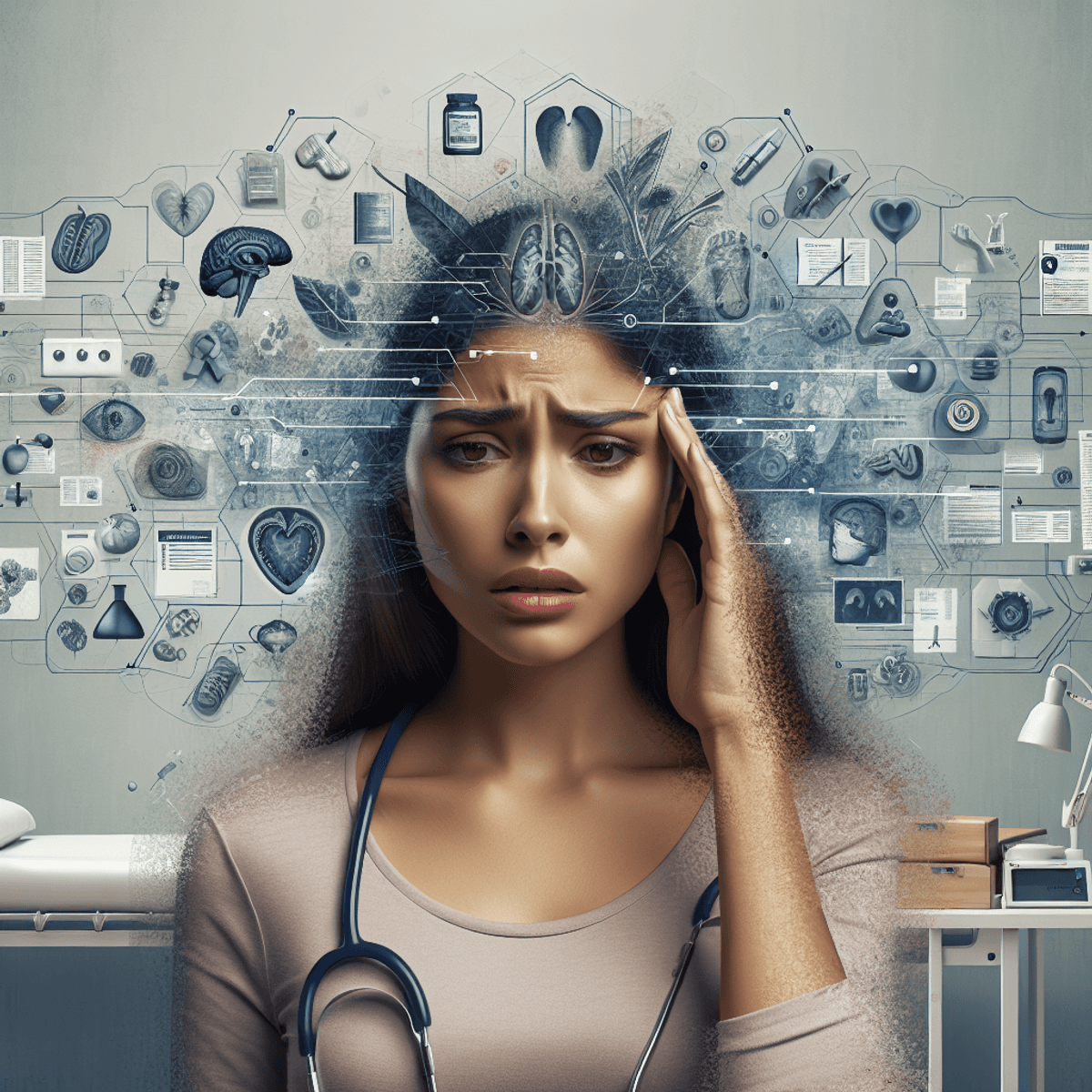
Key Points:
- Overlap in Symptoms: Both conditions can cause facial pain and pressure.
- Misdiagnosis Risk: Migraines can be mistaken for sinus headaches due to overlapping symptoms.
- Clinical Findings: Research suggests many sinus headache diagnoses may actually be migraines.Specialized Clinics: Sinusitis-Migraine Clinics provide comprehensive evaluation and treatment options.
- Expertise Matters: Medical professionals with knowledge in both sinusitis and migraines ensure accurate diagnosis.
- Effective Treatment: Precise diagnosis leads to targeted treatment, potentially reducing headache frequency and severity.
- Awareness is Key: Encourage individuals with recurring sinus-like headaches to seek specialized care for an accurate diagnosis.Overlap in Symptoms: Both conditions can cause facial pain and pressure.
- Misdiagnosis Risk: Migraines can be mistaken for sinus headaches due to overlapping symptoms.
- Clinical Findings: Research suggests many sinus headache diagnoses may actually be migraines.
- Specialized Clinics: Sinusitis-Migraine Clinics provide comprehensive evaluation and treatment options.
- Expertise Matters: Medical professionals with knowledge in both sinusitis and migraines ensure accurate diagnosis.
- Effective Treatment: Precise diagnosis leads to targeted treatment, potentially reducing headache frequency and severity.
- Awareness is Key: Encourage individuals with recurring sinus-like headaches to seek specialized care for an accurate diagnosis.Overlap in Symptoms: Both conditions can cause facial pain and pressure.
- Misdiagnosis Risk: Migraines can be mistaken for sinus headaches due to overlapping symptoms.
- Clinical Findings: Research suggests many sinus headache diagnoses may actually be migraines.
- Specialized Clinics: Sinusitis-Migraine Clinics provide comprehensive evaluation and treatment options.
- Expertise Matters: Medical professionals with knowledge in both sinusitis and migraines ensure accurate diagnosis.
- Effective Treatment: Precise diagnosis leads to targeted treatment, potentially reducing headache frequency and severity.
- Awareness is Key: Encourage individuals with recurring sinus-like headaches to seek specialized care for an accurate diagnosis.

Understanding this connection is crucial in developing effective treatment plans tailored to individual needs. Accurate diagnosis ensures that patients receive appropriate care, reducing the risk of ineffective treatments and prolonged discomfort. This may also help alleviate the burden on healthcare resources, as misdiagnosed sinusitis cases may be unnecessarily treated with antibiotics or other sinus-specific interventions. By fostering collaboration between specialists in sinusitis and migraines, Sinusitis-Migraine Clinics provide a comprehensive approach to diagnosis and treatment, improving patient outcomes and quality of life. Through increased awareness and access to specialized care, individuals suffering from recurring sinus-like headaches can find relief and regain control over their health.
Treatment Options at a Specialized Clinic
Accurate diagnosis is crucial in determining the right treatment approach for Sinusitis and Migraine. A thorough evaluation usually includes a combination of patient history, physical examination, and imaging studies. This comprehensive assessment helps differentiate between conditions with similar symptoms, ensuring personalized treatment plans. These plans may include a range of interventions, such as medication, lifestyle modifications, trigger management, and in some cases, minimally invasive procedures.
Specialists at Sinusitis-Migraine Clinics are well-equipped to offer these treatment options, drawing from their expertise in both sinusitis and migraines. By addressing the root causes of the symptoms and tailoring interventions to individual needs, these clinics pave the way for more effective and targeted care. This integrated approach not only improves patient outcomes but also contributes to a more efficient utilization of healthcare resources.
At a specialized Sinusitis Migraine Treatment Center, you can expect:
- Comprehensive Evaluation: Detailed patient history, symptom assessment, and physical examination.
- Imaging Studies: Advanced techniques like X-rays or CT scans to identify sinus blockages or other structural issues.
Standard treatments vary based on the diagnosis:
For Sinusitis
- Antibiotics: Prescribed for bacterial infections.
- Antihistamines and Decongestants: Helpful in managing allergy-related symptoms.
- Pain Relievers: Over-the-counter medications such as ibuprofen or acetaminophen.
- Corticosteroids: Used to reduce inflammation in chronic cases. For Migraines
- Triptans: Medications that target the specific mechanisms involved in migraines.
- Preventive Medications: Prescribed to reduce the frequency or severity of migraine attacks.
- Lifestyle Modifications: Strategies like stress management, regular sleep patterns, and avoiding trigger factors.
- Minimally Invasive Procedures: Options like nerve blocks or Botox injections for chronic or severe cases.
- Patient Education and Support: Information on self-care, coping strategies, and resources for ongoing support.
- By offering a comprehensive range of treatment options and prioritizing personalized care, Sinusitis-Migraine Clinics aim to empower patients in their journey towards relief and improved quality of life.

For Migraines
- Over-the-Counter Pain Relievers: Medications like aspirin or ibuprofen can alleviate mild migraine symptoms.
- Triptans: These prescription medications are effective in treating acute migraine attacks by targeting serotonin receptors and reducing inflammation.Preventive Medications: For individuals with frequent or severe migraines, doctors may prescribe medications like beta blockers or antiepileptic drugs to help reduce the frequency and intensity of attacks.
- Lifestyle Modifications: In addition to medication, adopting healthy habits like regular exercise, stress reduction techniques, and maintaining a consistent sleep schedule can play a crucial role in managing migraines.
- Alternative Therapies: Some individuals find relief through practices such as acupuncture, biofeedback, or herbal supplements. While research on their effectiveness is limited, they may be worth exploring under the guidance of a healthcare professional.
- Supportive Care: Migraine support groups, online forums, and educational resources can provide valuable information and emotional support to individuals navigating the challenges of living with migraines.
Accurate diagnosis is crucial in managing these conditions effectively. The specialized care provided at centers such as Disha Arogya Dham ensures that patients receive targeted treatments based on their specific needs.he specialized care provided at centers such as Disha Arogya Dham ensures that patients receive targeted treatments based on their specific needs. Additionally, keeping a migraine diary can help identify triggers and patterns, aiding in the development of personalized management strategies. Remember, managing migraines is a collaborative effort between healthcare professionals and patients, and open communication is key to finding effective solutions.
Alternative Therapies Offered at Disha Arogya Dham
Disha Arogya Dham integrates alternative therapies that offer a holistic approach to treating sinusitis and migraines. These therapies include:
– Acupuncture: The insertion of thin needles at specific points on the body, which can help alleviate pain and promote overall well-being.
– Ayurveda: A traditional Indian system of medicine that uses herbal remedies, dietary changes, and lifestyle modifications to restore balance in the body.
– Homeopathy: The use of highly diluted substances to stimulate the body’s natural healing processes. These alternative therapies can complement conventional treatments and provide relief to patients who may have not found success with traditional approaches alone. It is important to note that while these therapies can be beneficial, they should be used under the guidance of trained professionals. Disha Arogya Dham’s team of experts can assess each patient’s condition and recommend the most suitable combination of treatments, ensuring a personalized and comprehensive approach to sinusitis and migraine management.
By combining conventional treatments with these alternative therapies, Disha Arogya Dham aims to provide comprehensive care that addresses the root causes of sinusitis and migraines while minimizing reliance on medications. This integrative approach can lead to long-term relief and improved quality of life for patients.
Ayurvedic Treatments
Ayurveda, a traditional system of medicine from India, provides a range of herbal remedies for managing both sinus issues and migraines. Key treatments include:
- Nasya Therapy: Administering medicated oils or herbal juices through the nasal passage to clear the sinuses. This therapy can help reduce inflammation and congestion, providing relief from sinusitis symptoms.
- Shirodhara: A technique where a steady stream of warm herbal oil is poured over the forehead. This deeply relaxing treatment can alleviate stress and tension, which are common triggers for migraines.
- Panchakarma: A detoxification process that involves a series of therapies to eliminate toxins from the body. This can help address underlying imbalances and promote overall well-being.
- Homeopathic Remedies
- Homeopathy offers individualized treatment plans based on the specific symptoms and constitution of each patient. Some commonly used remedies for sinusitis and migraines include:
- Belladonna: Useful for acute sinusitis with throbbing pain and intense pressure in the head.
- Sanguinaria: Indicated for right-sided migraines with pain radiating from the neck to the right eye.
- Silicea: Effective for chronic sinusitis with recurring infections and a tendency to develop abscesses.
- Kavala Graha: Gargling with warm herbal decoctions to reduce throat and sinus inflammation.
- Ayurvedic medications: Formulations like Triphala and Chyawanprash which enhance immunity and reduce chronic respiratory issues. Ayurvedic medications: Formulations like Triphala and Chyawanprash which enhance immunity and reduce chronic respiratory issues.
- Acupuncture: This ancient Chinese therapy involves the insertion of thin needles at specific points on the body to alleviate pain and promote healing. It has been found to be effective in reducing the frequency and severity of both sinusitis and migraine attacks.
- Stress management techniques: Practicing relaxation techniques such as deep breathing, meditation, and yoga can help reduce stress levels, which are often triggers for migraines.
- Dietary changes: Avoiding trigger foods such as processed meats, aged cheeses, chocolate, and alcohol can help prevent migraine attacks. Consuming a diet rich in fruits, vegetables, whole grains, and lean proteins can support overall health and immune function.
- It’s important to consult with a qualified healthcare practitioner before starting any new treatment or making significant changes to your current regimen. They can help create a personalized plan that addresses your specific needs and ensures optimal results.”

Naturopathic Approaches
Naturopathy emphasizes natural healing processes and lifestyle changes. Some effective naturopathic treatments offered at Disha Arogya Dham include:
- Dietary Adjustments: Identifying and eliminating food triggers that may exacerbate sinusitis or migraines.
- Nutritional Supplements: Use of supplements such as Vitamin C, Bromelain, and Quercetin known for their anti-inflammatory properties.
- Hydrotherapy: Techniques like steam inhalation and saline nasal washes to alleviate sinus congestion. Herbal Remedies: Utilizing herbs like Butterbur and Feverfew, which have shown promise in reducing the frequency and severity of migraines.
- Stress Management: Incorporating stress-reducing techniques such as mindfulness, aromatherapy, and acupuncture to promote relaxation and lower the likelihood of migraine attacks.
- It’s important to note that while naturopathic approaches can be beneficial for many individuals, they may not be suitable for everyone. It’s always best to consult with a qualified naturopathic practitioner who can assess your individual needs and create a personalized treatment plan.”
These therapies aim to address the root causes of symptoms, providing a comprehensive plan for long-term relief.This holistic approach integrates lifestyle modifications, diet, and natural therapies to support the body’s innate healing capacity. While naturopathic treatments can be effective, it’s essential to work with a qualified practitioner who can tailor the treatment plan to your unique needs. By combining conventional medical interventions with naturopathic approaches, you can optimize your chances of finding relief from sinusitis or migraines while enhancing your overall well-being.
Natural Solutions and Lifestyle Modifications for Prevention
Effective Herbal Options
Managing sinus infections and alleviating migraine symptoms can often be approached with herbal solutions. Commonly used herbs include:
- Ginger: Known for its anti-inflammatory properties, ginger can reduce migraine severity and help with sinus congestion.
- Butterbur: This herb has shown promise in reducing the frequency of migraines.
- Peppermint and Eucalyptus oil: Inhalation of these oils can relieve nasal congestion and sinus pressure.
- Turmeric: Its active compound, curcumin, is known to reduce inflammation, easing both sinusitis and migraine symptoms.

These herbal options are part of a broader natural approach that includes various lifestyle modifications. Incorporating stress reduction techniques such as meditation, yoga, or deep breathing exercises can help manage both sinusitis and migraines. Regular exercise, adequate sleep, and maintaining a healthy diet rich in fruits, vegetables, and omega-3 fatty acids can also support overall well-being and reduce the frequency of these conditions. It’s important to note that while natural remedies can be effective, it’s always advisable to consult with a healthcare professional before starting any new treatment regimen.
Common Triggers to Avoid
Identifying and avoiding triggers is crucial in preventing both sinus headaches and migraines. Some common triggers include:
- Foods: Certain foods such as aged cheeses, processed meats, and foods containing MSG can trigger migraines. Dairy products and gluten may exacerbate sinus issues.
- Stress: High stress levels are a major trigger for migraines. Stress-reduction techniques such as meditation, yoga, or deep-breathing exercises can be beneficial.
- Environmental Factors: Allergens like pollen, dust mites, and mold can lead to sinus inflammation. Using air purifiers and maintaining clean living spaces can help mitigate these triggers.
- Weather Changes: Sudden changes in weather or barometric pressure are known to trigger migraines for some individuals.
- Dehydration: Staying well-hydrated is key in preventing both sinusitis and migraines. Adequate hydration helps keep nasal passages moist and prevents sinus congestion. It also supports overall brain function and reduces the risk of migraines. It’s recommended to drink at least 8 cups of water per day, or more if you engage in physical activity or live in a hot climate. Avoiding excessive caffeine and alcohol is also advisable, as they can contribute to dehydration.
Incorporating these herbal solutions along with lifestyle modifications can significantly reduce the frequency and severity of symptoms related to both conditions. It’s also important to note that regular exercise and maintaining a healthy diet can have a positive impact on both sinusitis and migraines. Adequate sleep and managing any underlying medical conditions, such as allergies or hormonal imbalances, can further contribute to overall symptom relief. While natural remedies can provide relief, it’s always best to consult with a healthcare professional for a comprehensive treatment plan tailored to your specific needs.
Conclusion: Finding Relief with Specialized Care at Disha Arogya Dham
Consider seeking help from a specialized clinic like Disha Arogya Dham for effective management of Sinusitis and Migraines. Their expertise in differentiating symptoms and tailored treatment plans can significantly enhance your quality of life. By researching “Sinusitis Migraine Treatment Center” and focusing on specialized care, you take a crucial step towards lasting relief. Don’t let misdiagnosis keep you in discomfort; trust the professionals at Disha Arogya Dham to guide you towards a healthier, symptom-free future. a specialized clinic like Disha Arogya Dham for effective management of Sinusitis and Migraines.
Their expertise in differentiating symptoms and tailored treatment plans can significantly enhance your quality of life. By researching “Sinusitis Migraine Treatment Center” and focusing on specialized care, you take a crucial step towards lasting relief. Don’t let misdiagnosis keep you in discomfort; trust the professionals at Disha Arogya Dham to guide you towards a healthier, symptom-free future.
FAQs (Frequently Asked Questions)
What is Sinusitis and what are its symptoms?
Sinusitis is an inflammation of the sinuses often caused by viral infections. Common symptoms include pain around the eyes, cheeks, and forehead. Other symptoms may include nasal congestion, thick nasal discharge, postnasal drip, and reduced sense of smell. In some cases, sinusitis can lead to headaches, facial swelling, and fever.
What are the common triggers for Migraines?
Migraines can be triggered by various factors, including hormonal changes, certain foods or drinks (such as caffeine or alcohol), stress, lack of sleep, bright lights or loud noises, strong smells, and changes in weather or altitude. It is important to identify your triggers to help manage and prevent migraines.
How can Disha Arogya Dham help in managing Sinusitis and Migraines?
Disha Arogya Dham specializes in the comprehensive diagnosis and treatment of sinusitis and migraines. Their team of experienced doctors will carefully evaluate your symptoms, perform necessary tests, and design a personalized treatment plan tailored to your needs. They may recommend a combination of medication, lifestyle modifications, sinus irrigation techniques, or in some cases, minimally invasive procedures to provide lasting relief from your symptoms.
Is specialized care for Sinusitis and Migraines worth it?
Absolutely. Misdiagnosis or inadequate management of sinusitis and migraines can lead to ongoing discomfort and reduced quality of life. Seeking specialized care at Disha Arogya Dham ensures that you receive accurate diagnosis, individualized treatment plans, and access to the latest advancements in sinus and migraine care. Investing in your health with their expertise can significantly improve your well-being and long-term outcomes.
Don’t let Sinusitis or Migraines hold you back; take the first step towards effective management by reaching out to Disha Arogya Dham today.
How do migraines differ from sinus headaches?
Migraines are characterized by throbbing pain and often include nausea, while sinus headaches typically involve pressure in the sinuses. It’s important to distinguish between the two for effective treatment. This distinction is crucial because while sinus headaches can be managed with targeted treatments for sinusitis, migraines require specialized interventions.
At Disha Arogya Dham, their team of experts will accurately diagnose your condition, ensuring that you receive the most appropriate treatment plan tailored to your specific needs. Don’t let the pain of migraines or sinusitis control your life; seek specialized care at Disha Arogya Dham to regain control and improve your quality of life.
What is the connection between Sinusitis and Migraines?
Sinusitis can mimic migraine symptoms, which may lead to misdiagnosis. Clinical research has shown that there is a significant overlap in symptoms between these two conditions. This can make it challenging to differentiate between sinusitis and migraines based solely on symptoms. It is crucial to consult with a medical professional who specializes in headache disorders, like the experts at Disha Arogya Dham, for an accurate diagnosis. By doing so, you can ensure that you receive the most effective treatment and management plan for your specific condition, leading to improved outcomes and a better quality of life.
What treatment options are available at specialized clinics like Disha Arogya Dham?
At specialized clinics, a comprehensive evaluation is conducted to ensure accurate diagnosis. Treatment options may include over-the-counter pain relievers for migraines and specific therapies for Sinusitis. These therapies can range from nasal irrigation and saline rinses to prescription medications, such as antibiotics or corticosteroids, depending on the severity and underlying cause of sinusitis. In more severe cases, minimally invasive procedures like balloon sinuplasty may be recommended. The experienced medical professionals at Disha Arogya Dham will determine the most appropriate treatment plan tailored to your specific needs, ensuring comprehensive care and long-term management of your condition.
What alternative therapies does Disha Arogya Dham offer for managing Sinusitis and Migraines?
Disha Arogya Dham offers Ayurvedic treatments such as herbal remedies for managing sinus issues and migraines, as well as naturopathic approaches tailored to individual needs. These alternative therapies can help alleviate symptoms and promote overall well-being. Additionally, specialized clinics like Disha Arogya Dham may provide lifestyle guidance, including dietary recommendations, stress management techniques, and exercises targeted at improving sinus health and reducing migraine frequency. This holistic approach ensures that patients have a comprehensive range of treatment options to choose from, maximizing their chances of finding relief and achieving long-term management of their conditions.
How can lifestyle modifications help prevent Sinusitis and Migraines?
Effective lifestyle modifications include avoiding known triggers such as certain foods and stress. Additionally, using herbal solutions can help manage symptoms and prevent both conditions from worsening. These lifestyle modifications, when combined with a well-rounded treatment plan, can significantly improve the quality of life for individuals suffering from sinusitis and migraines. Disha Arogya Dham’s comprehensive approach ensures that patients are empowered with both traditional and alternative therapies, providing them with a higher chance of finding relief and long-term management of their conditions.


